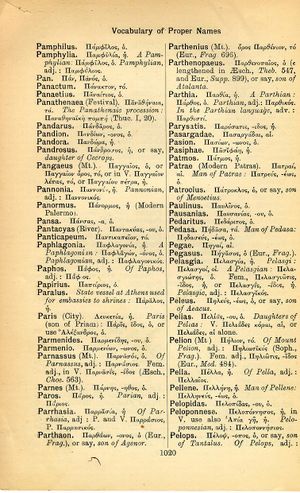Parthenopaeus: Difference between revisions
πολλὰ μεταξὺ πέλει κύλικος καὶ χείλεος ἄκρου → there is many a slip twixt cup and lip, there's many a slip twixt cup and lip, there's many a slip 'twixt cup and lip, there's many a slip twixt the cup and the lip, there's many a slip 'twixt the cup and the lip
(D_6) |
(Gf-D_6) |
||
| Line 1: | Line 1: | ||
{{WoodhouseENELnames | {{WoodhouseENELnames | ||
|Text=[[File:woodhouse_1020.jpg|thumb|link= | |Text=[[File:woodhouse_1020.jpg|thumb | ||
|link={{filepath:woodhouse_1020.jpg}}]]Παρθενοπαῖος, ὁ (ε lengthened in Aesch., ''Theb.'' 547, and Eur., ''Supp.'' 899), or say, <b class="b2">son of Atalanta.</b> | |||
}} | }} | ||
{{Lewis | {{Lewis | ||
Revision as of 07:43, 14 August 2017
English > Greek (Woodhouse)
Παρθενοπαῖος, ὁ (ε lengthened in Aesch., Theb. 547, and Eur., Supp. 899), or say, son of Atalanta.
Latin > English (Lewis & Short)
Parthĕnŏpaeus: i, m., = Παρθενοπαῖος,
I the son of Meleager and Atalante, one of the seven who went against Thebes: inclutus armis Parthenopaeus, Verg. A. 6, 480; Stat. Th. 4, 248; cf. Hyg. Fab. 99.
Latin > French (Gaffiot 2016)
Parthĕnŏpæus,¹⁶ ī, m. (Παρθενοπαῖος), Parthénopée [roi d’Arcadie, fils de Méléagre et d’Atalante, un des sept chefs qui assiégèrent Thèbes et périrent devant cette ville] : Virg. En. 6, 430 ; Stat. Th. 4, 248.

